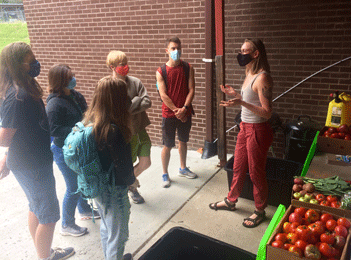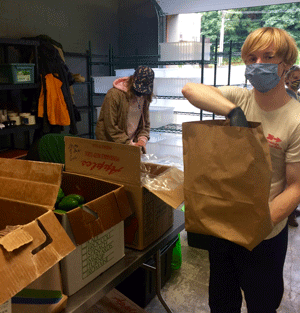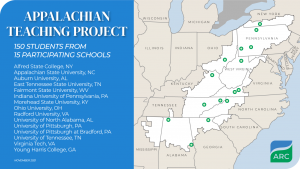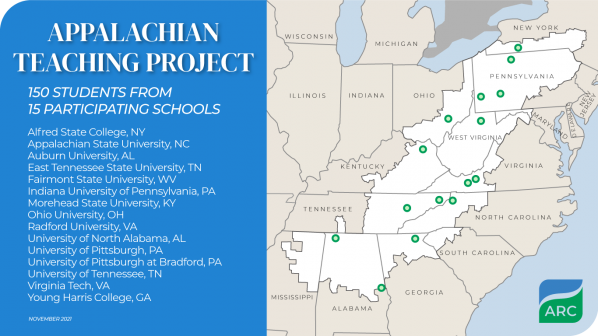Eighteen of Appalachian State University’s Watauga Residential College students participated in the 21st annual Appalachian Teaching Project (ATP) Symposium, a regional economic development conference sponsored by the Appalachian Regional Commission (ARC). Their project titled “Building market channels for local food in the North Carolina High Country” allowed students to develop, implement and study the impact of a new food box program called LocalFAM, which distributed over 4,000 pounds of fresh, sustainably grown produce to local food-insecure households.
“My experience with this course was extremely positive. I learned a lot about food insecurity, especially in the Appalachian region. The course greatly impacted my thoughts on the industrial food system of America, and it made me want to change the way I eat so that I do not support CAFOs [concentrated animal feeding operations] and monocropping farms,” said Carter Sullivan, a sophomore from Lewisville.
LocalFAM, which stands for “Food as Medicine,” is operated by Blue Ridge Women in Agriculture (BRWIA), a woman-led nonprofit dedicated to building an equitable, sustainable local food system. Since August, students helped BRWIA pack 600 food boxes, which served 50 families a week over a 12 week period. Local farmers in the Boone area were paid over $17,000 to participate in the project.

Caption: Local produce that was included in a LocalFAM food box. These boxes were packed by students assisting local organization Blue Ridge Women in Agriculture (BRWIA) and served 50 families a week. Photo by Dr. Jessica Martell.
To prepare for the ATP Symposium, students in App State’s Watauga Residential College enrolled in a course titled “A Critical Perspective on Food,” an intense double academic course taught by Dr. Jessica Martell, assistant professor in the Department of Interdisciplinary Studies.
“My classmates and I learned about how the industrial food system prioritizes financial gain over the wellbeing of the people it feeds. Volunteering at the High Country Food Hub every Wednesday has become a treasured part of my life. It is incredibly fulfilling to know that the work I do there directly leads to a person in our community getting to eat good, nutritious food,” said Dex Williams, a sophomore from Cary.

Caption: Watauga Residential College students receive direction from Jessica McClelland, the produce programs coordinator for Blue Ridge Women in Agriculture (BRWIA). During the fall semester of 2021, students helped BRWIA pack 600 boxes full of fresh, sustainably-grown produce, which served 50 families a week over a 12 week period. Local farmers in the Boone area were paid over $17,000 to participate in the project. Photo by Dr. Jessica Martell.
The course encouraged students to address regional challenges in Appalachian communities. Each ATP project reflects one of four themes that connect back to the ARC strategic plan:
- addressing community needs and challenges;
- economic development;
- tourism; and
- capacity building.
As a capstone to this work, students normally travel to Washington, D.C. to present their work to student delegations from other ATP participating institutions, ARC leadership and community leaders in a formal peer-to-peer conference setting hosted by ARC. This year, due to COVID-19, the ATP Symposium was held online.
Participants included the following students:
- Luke Brown–Psychology
- Gabby Buck–History, applied and public history
- Brittany Byrum–Interior design
- Olivia Caldwell–Chemistry, biochemistry
- Will Conger–English, secondary education
- Rowan Davis–Environmental science, life science
- Jessie Frisby–Biology, cell/molecular biology
- Lauren Griffin–Management
- Allison McIntyre–Communication Science and Disorders
- Joey Seevers–Mathematics, statistics
- Zayna Sheridan–Interdisciplinary studies
- Carson Turner–Marketing, digital marketing
- Dex Williams–Psychology, sustainability
- Mia Fraticelli–Exercise science
- Jessica Gerac–undeclared
- George Gogel–English, creative writing
- Kira Montambo–undeclared
- Carter Sullivan–History
More about the Appalachian Teaching Project and App State
Since 2001, over 2,650 college and graduate students from across Appalachia have participated in the Appalachian Teaching Project. This is the twenty-first year that a student delegation from App State has participated in ATP.
Tom Hansell and Dr. Julie Shepherd-Powell, professors of Appalachian Studies and in the Department of Interdisciplinary Studies at App State, which houses Watauga Residential College, supported Martell and her students, both having taught Appalachian Teaching Project-related classes in the past.
Martell notes, "It's been gratifying to foster a new interdepartmental collaboration between Watauga Residential College and Appalachian Studies, especially one that immerses more undergraduates in the study of the Appalachian region while increasing access to high-quality local food in our mountain community."
Many ATP alumnae have gone on to careers in public service, community development and other related fields across the region. ATP is one of four academies and institutes sponsored by the Appalachian Regional Commission. Through these experiential learning opportunities, participants build networks, hone skills and cultivate an enduring commitment to Appalachia’s future.

Caption: Watauga Residential College students packing boxes of local produce for families in need in the N.C. High Country with members of Blue Ridge Women in Agriculture (BRWIA) for a project called LocalFAM. The students were part of a course called, “A Critical Perspective on Food” that culminated in a research project entitled, “Building market channels for local food in the North Carolina High Country.” Photo by Dr. Jessica Martell.
“Appalachia needs young leaders, like those participating in the Appalachian Teaching Project, to bring forward-thinking economic development plans to life,” said ARC Federal Co-Chair Gayle Manchin. “This group of change-makers is capable of creating positive impacts in our communities, and I am excited to see the lasting effects these innovative projects will have on our region long-term.”
Supported by ARC and organized by the Center for Appalachian Studies and Services at East Tennessee State University (ETSU), students receive college credit for participating in ATP, and schools participating in ATP offer a directed seminar guiding students in developing and executing field-based research projects specific to the needs of their surrounding communities and in alignment with one of ARC’s strategic investment priorities. Summaries of each research project from the symposium are available at www.arc.gov/atp.
###
About the Appalachian Regional Commission
The Appalachian Regional Commission (www.arc.gov) is an economic development agency of the federal government and 13 state governments focusing on 423 counties across the Appalachian Region. ARC’s mission is to innovate, partner, and invest to build community capacity and strengthen economic growth in Appalachia to help the Region achieve socioeconomic parity with the nation.
About the Department of Interdisciplinary Studies
The Department of Interdisciplinary Studies offers graduate and undergraduate degrees in four program areas: Appalachian studies; gender, women’s and sexuality studies; global studies; and interdisciplinary studies. The department is also home to Watauga Residential College, an interdisciplinary, alternative general education program. The department promotes creative and imaginative engagement through a cross-disciplinary investigation of complex systems and problems. Learn more at https://interdisciplinary.appstate.edu.
About the Watauga Residential College at Appalachian
The Watauga Residential College is a specialized academic program where classes are discussion-based seminars that allow students to pursue topics of interest to them within the context of the class. This program provides an unusual opportunity for students to become engaged in learning at a deep level through class discussions and research projects. Watauga classes are interdisciplinary, and this approach to learning requires students to integrate knowledge from a variety of disciplines to gain a complete perspective on a topic. Learn more at https://watauga.appstate.edu.
By Ellen Gwin Burnette
February 2, 2022
BOONE, N.C.

